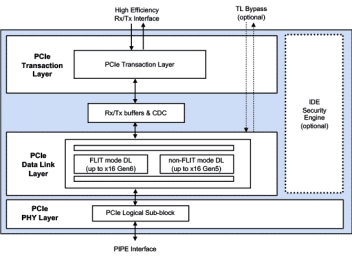PCI Express 6.0 Controller IP
Filter
Compare
33
IP
from
6
vendors
(1
-
10)
-
IDE Security IP Modules for PCI Express 7.0
- Full support of PCI Express 7.0 (64GT/s) IDE specification
- High-performance AES-GCM based packet encryption, decryption, authentication
- Seamless integration with Synopsys controllers via TLP/FLIT packet-based interface
- FLIT mode support
- Support for PCIe 7.0, 6.0, 5.0, 4.0 and 3.1 data rates
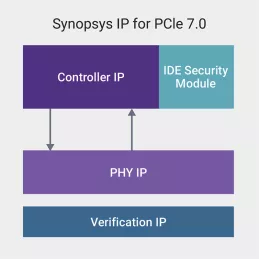
-
PCIe 6.0 Retimer Controller with CXL Support
- Designed to the latest PCI Express 6.0 (64 GT/s), and capable of supporting 32.0, 16.0, 8.0, 5.0 and 2.5 GT/s link rates
- Supports x1, x2, x4, x8 and x16 link widths
- CXL aware and supports sync header bypass
- Supports PIPE 5.2/6.1 compatible PHYs
- Optimized data-path for low latency insertion
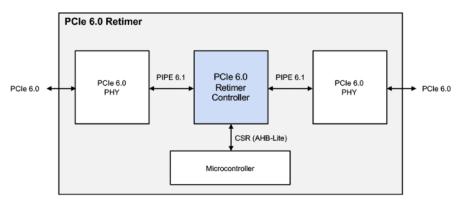
-
PCIe 6.0 / CXL 3.0 PHY & Controller
- Innosilicon’s PCIe 6.0 and CXL 3.0 IP solutions combine high-performance controllers and PHYs, fully compliant with PCIe 6.0, CXL 3.0, and PIPE specifications
- These solutions deliver exceptional performance, low latency, power efficiency, and unparalleled flexibility, making them ideal for enterprise computing, data centers, cloud servers, AI and machine learning, storage expansion, and high-speed interconnect applications
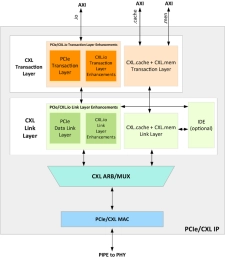
-
PCIe 6.0 (Gen6) Premium Controller with AMBA bridge and LTI & MSI Interfaces
- Supports all required features of the PCI Express 6.2/6.1/6.0.1 (64GT/s), 5.0 (32 GT/s), 4.0 (16 GT/s), 3.1 (8 GT/s) and PIPE (32-bit) specifications
- Based on silicon-proven PCIe 6.x controller design
- Allows a full 64GT/s x16 lane bandwidth with up to 1024-bit data path implementations
- Supports advanced RAS data protection features including ECC
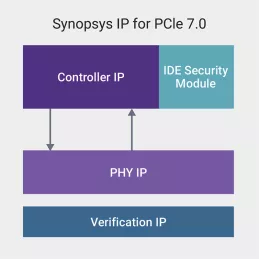
-
PCIe 6.0 (Gen6) Premium Controller with AMBA bridge
- Supports all required features of the PCI Express 6.2/6.1/6.0.1 (64GT/s), 5.0 (32 GT/s), 4.0 (16 GT/s), 3.1 (8 GT/s) and PIPE (32-bit) specifications
- Based on silicon-proven PCIe 6.x controller design
- Allows a full 64GT/s x16 lane bandwidth with up to 1024-bit data path implementations
- Supports advanced RAS data protection features including ECC
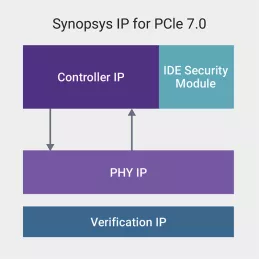
-
PCIe 6.0 (Gen6) Premium Controller
- Supports all required features of the PCI Express 6.2/6.1/6.0.1 (64GT/s), 5.0 (32 GT/s), 4.0 (16 GT/s), 3.1 (8 GT/s) and PIPE (32-bit) specifications
- Based on silicon-proven PCIe 6.x controller design
- Allows a full 64GT/s x16 lane bandwidth with up to 1024-bit data path implementations
- Supports advanced RAS data protection features including ECC
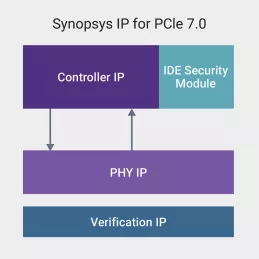
-
PCIe 6.0 (Gen6) Premium Controller EP/RP/DM/SW 128-1024 bits with AMBA bridge and Advanced HPC Features (Arm CCA)
- Supports all required features of the PCI Express 6.2/6.1/6.0.1 (64GT/s), 5.0 (32 GT/s), 4.0 (16 GT/s), 3.1 (8 GT/s) and PIPE (32-bit) specifications
- Based on silicon-proven PCIe 6.x controller design
- Allows a full 64GT/s x16 lane bandwidth with up to 1024-bit data path implementations
- Supports advanced RAS data protection features including ECC
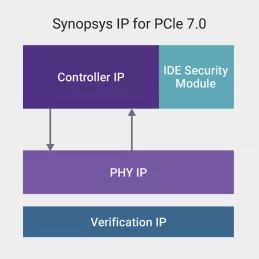
-
Adds security Interfaces, features to PCIe 6.0 Premium controllers (Gen6)
- Supports all required features of the PCI Express 6.2/6.1/6.0.1 (64GT/s), 5.0 (32 GT/s), 4.0 (16 GT/s), 3.1 (8 GT/s) and PIPE (32-bit) specifications
- Based on silicon-proven PCIe 6.x controller design
- Allows a full 64GT/s x16 lane bandwidth with up to 1024-bit data path implementations
- Supports advanced RAS data protection features including ECC
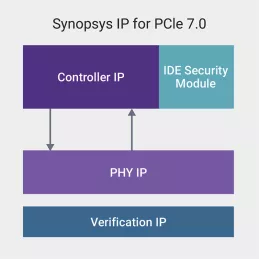
-
Configurable controllers for PCIe 6.0 supporting Endpoint, Root Complex, Switch Port, and Dual Mode applications
- Available in all port types including: Endpoint, Embedded Endpoint, Root Complex, Switch Port, Bridge, Dual Mode (Endpoint/Root Complex), and Multi-Port Switch
- Full Transaction Layer, Data Link Layer and Physical Layer
- Supports up to sixteen 64.0, 32.0, 16.0, 8.0, 5.0, 2.5 GT/s lanes
- Available in 32-, 64-, 128-, 256-, 512- or 1024-bit datapath widths for maximum flexibility
-
PCIe Gen 6 controller IP
- Designed to the latest PCI Express 6.0 (64 GT/s), 5.0 (32 GT/s), 4.0 (16 GT/s), 3.1/3.0 (8 GT/s), and PIPE 6.x (8, 16, 32, 64 and 128-bit) specifications
- Supports SerDes Architecture PIPE 10b/20b/40b/80b width
- Supports original PIPE 8b/16b/32b/64b/128b width
